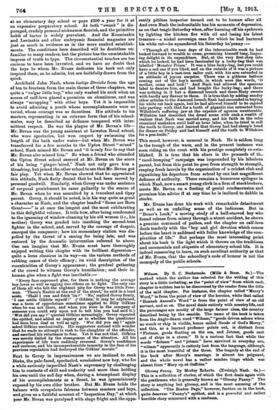Wiisam. By S. C. Nethersole. (Mills & Boon. 6s.) — The method
which the author has selected for the writing of this story is a little irritating, as the "point of view" from which each chapter is written has to be discovered by the reader from the title of the said chapter. For instance, the chapter called "Mercy's Word," is from the point of view of the heroine, while that called "Hannah Anseed's Word" is from the point of view of an old servant, and so on. The novel deals entirely with country life, and the personages are mostly of the large farmer class, the country described being by the seaside. The name of the book is taken from the Anglo-Saxon word "Wilsam," "goods driven ashore when no wreck or ship is visible, hence called Goods of God's Mercy," and this, as a learned professor points out, is distinct from "Flotsam, goods floating on the sea, and Jetsam, goods cast out of ships in a storm." It is a curious fact that while the words "flotsam" and "jetsam" have survived in everyday use, "wilsam" apparently is entirely lost from the language, although it is the most beautiful of the three. The tragedy at the end of the book after Mercy's marriage is almost too poignant, and the whole novel has a rather sombre tinge which was absent from "Mary up at Gaffries."


















































 Previous page
Previous page